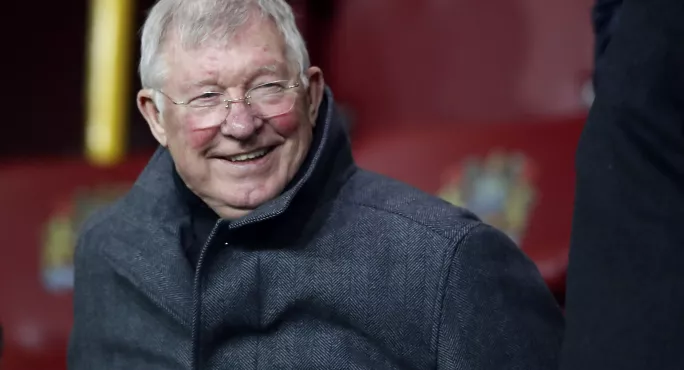
‘Sir Alex was here, it’s absolutely massive’

It feels as if a state visit has been arranged for Govan High’s centenary. An upright policeman scans the car park while 20 photographers unpack their unwieldy paraphernalia in the compact staffroom. Reporters are briefed about strict protocol: any questions unrelated to the school, and media access risks being removed.
The school’s most famous ex-pupil is in the building, and while he may not be royalty, he has created a dynasty. Since he arrived at Manchester United in 1986 after eight trophy-laden years at Aberdeen, the club has been champions of England 11 times and of Europe twice.
After he delivers an unscripted 25-minute assembly to all 344 pupils, plus 100 illustrious ex-pupils invited to celebrate the centenary, the football fans are in awe.
“I can’t believe he was here - it’s absolutely massive,” says Govan High’s dux, 16-year-old David Whitten. When arguably the greatest manager in the history of British football repeatedly tells you to follow your dreams, it is, in David’s words, “sheer inspiration”.
The Alex Ferguson who visits the school is a far more complex character than the bellowing disciplinarian of popular imagination.
He does, however, repeatedly tell pupils about the fundamental importance of graft to success. When a youngster asks who Manchester United’s most hard-working player is, Sir Alex cocks his head as if perplexed by the question, and replies that they all are.
He cites the discipline he learned at home and in school as crucial to his success, and recalls with fondness his no-nonsense football coach George Symington - a man “loved and respected” by fathers for the same reasons he “terrified” his team.
Yet Sir Alex is no decrier of modern schools; he does not hark back to halcyon days when pupils knew their place. He recalls the “very structured” nature of 1950s school life, and that he “never had any association with the teachers”, although they were very good. Since then, “education has progressed”.
The Govan High of 2010 is “far different” from what he knew. He approves of one of the central planks of contemporary education - that pupils are “encouraged to express their personalities”. He is impressed by their confidence to grill him after his presentation, contrasting it to how he would have coped at that age, had he met his footballing heroes Willie Waddell and Willie Rae: “I would have been terrified.”
There is a tinge of ruefulness to his memories of school. He protests that he was clever, even if he did not shine academically (he had to leave and get a job, because his grades in English and maths were not good enough). He was, he believes, disadvantaged by having to sit a “prep year” which set him back a year. “School was difficult,” he says. “Education wasn’t my main concern.”
From an early age his aim was to make it in football. Much of his extended family emigrated to Canada in the late-1950s, but Sir Alex’s father remained in Scotland, largely because he was determined his son would be a footballer.
One would-be professional player, Gavin McCracken, 14, admits after hearing Sir Alex that he understands better the importance of hard work, and why teachers might sometimes give him a tough time - because they want him to do well.
Damian Zdunczyk, 15, wants to be a computer software engineer, but comes away wide-eyed with the same afterglow of inspiration: “If you want to do something, go for it - he was telling us to go for our dreams.”
Sir Alex has returned to his old school before, and clearly has a strong bond with headteacher Iain White. There is a warm, affectionate atmosphere as he arrives to speak, accompanied by a school band playing the abolitionist anthem “Battle Hymn of the Republic” - better known to football fans as the variant “Glory, Glory, Man United”.
Two girls, however, appear to have been left nonplussed. Mairead Linning, 15, and Nicola Hunter, 17, are aspiring hairdressers, who were persuaded to take a brush to Sir Alex’s hair as photographers looked for an eyecatching shot in the school’s salon.
As boys chatter excitedly around them, they lean back with an air of detached cool, and Mairead declares that she is only interested in Sir Alex’s team because “they’re hot”. Scrape through the teenage insouciance, though, and it’s clear an impression has been left. “We thought he would be dead up himself - most famous people don’t have time for anyone else,” Mairead says. “But he was just talking the way we would talk to people.”
The most powerful message Nicola took from the world-famous football manager was to remember where you come from. Sir Alex, she was taken aback to discover, once lived on her street. She gets enervated about anyone who bad-mouths Govan: “A lot of people don’t believe in us. They say it’s a bad place, that the school’s crap.”
Sir Alex is clearly on her side, as he tells a small group of pupils before he leaves: “You’ve got a bloody good headteacher, and good staff - and people who care about you.”
You need a Tes subscription to read this article
Subscribe now to read this article and get other subscriber-only content:
- Unlimited access to all Tes magazine content
- Exclusive subscriber-only stories
- Award-winning email newsletters
- Unlimited access to all Tes magazine content
- Exclusive subscriber-only stories
- Award-winning email newsletters
You need a subscription to read this article
Subscribe now to read this article and get other subscriber-only content, including:
- Unlimited access to all Tes magazine content
- Exclusive subscriber-only stories
- Award-winning email newsletters
- Unlimited access to all Tes magazine content
- Exclusive subscriber-only stories
- Award-winning email newsletters



